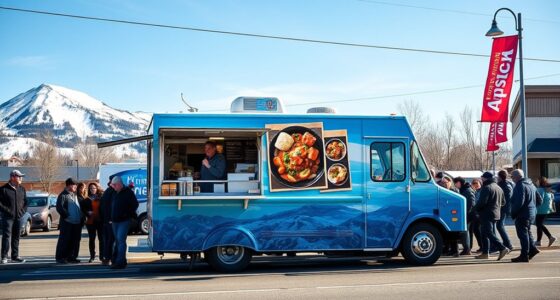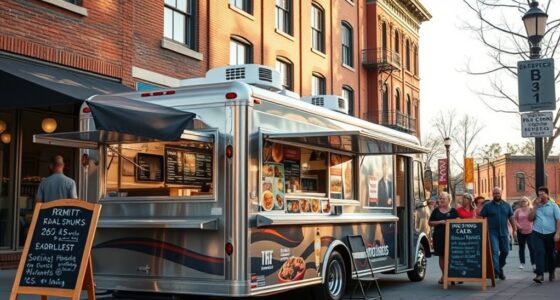To open a food truck in Asheville, you’ll need permits like a Mobile Food Unit or Food Truck Permit from Buncombe County and possibly a North Carolina Department of Agriculture Food Permit. Budget for startup costs between $40,000 and $150,000, plus ongoing expenses. Choose locations carefully, ensuring they meet zoning rules and have high foot traffic. Develop a safe, appealing menu and craft a marketing plan. Keep learning how to navigate every step for success.
Key Takeaways
- Obtain necessary permits from Buncombe County and Asheville city, including Mobile Food Unit, Food Truck, and health permits.
- Budget $40,000-$150,000 for startup costs, including trucks, equipment, permits, and initial inventory.
- Choose locations compliant with zoning, avoiding residential buffers, public rights-of-way, and ensuring proper parking.
- Develop a safe, appealing menu focusing on cooked, pre-packaged, and allergen-aware options to ensure food safety.
- Promote your food truck through local events, collaborations, social media, and loyalty programs to build visibility and customer loyalty.
Navigating Permits and Licensing Requirements
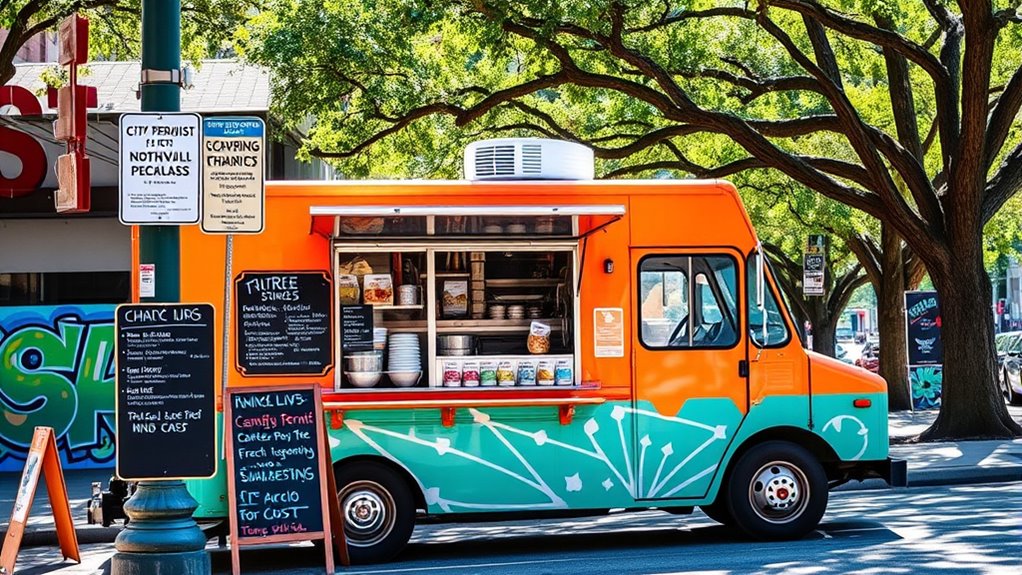
Navigating permits and licensing requirements is a vital step for operating a food truck in Asheville, North Carolina. You’ll need a Mobile Food Unit or Pushcart Permit from the Buncombe County Health Department, which requires daily reporting to a permitted commissary or restaurant for supplies and servicing. Additionally, you must obtain a Food Truck Permit for vendors and property owners, especially if operating on private land. An approved mobile food service permit is essential for food prep, sales, and inspections. Statewide, you’ll likely need a N.C. Department of Agriculture Food Permit and a Sales and Use Certificate for food handling and tax compliance. Depending on your setup, the City of Asheville might also require a commercial permit through their Development Services to guarantee your operation meets local standards. Ensuring proper herbal tea handling and storage procedures can also be crucial for compliance and customer safety.
Understanding Costs and Budgeting for Your Food Truck Venture
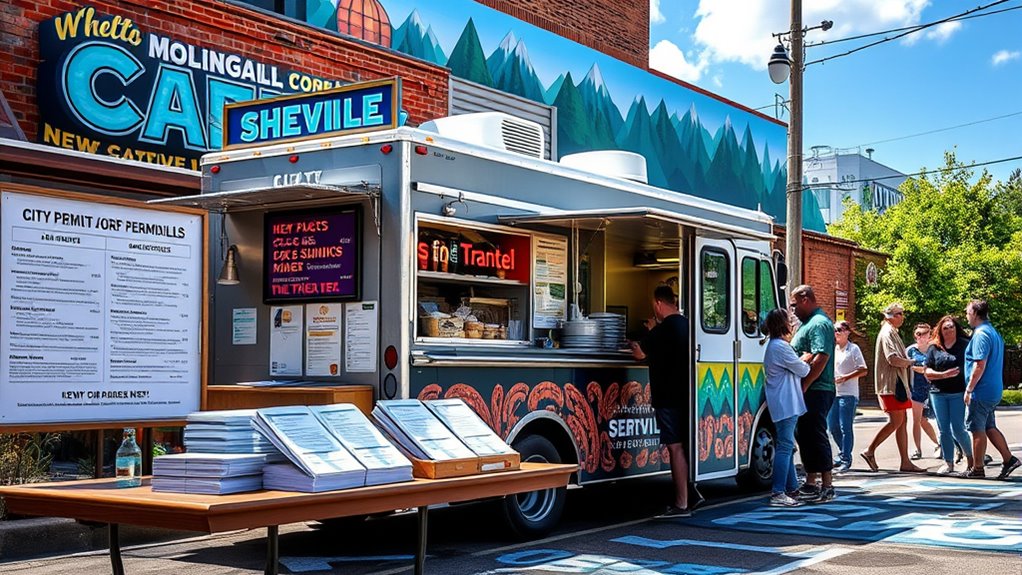
Starting a food truck business in Asheville requires careful planning of your costs and budget. Your initial investment can range from $40,000 to $150,000 for a new truck, with used options costing less. Expect to spend around $2,000 to $3,000 upfront on inventory, plus license and permit fees averaging about $1,864, though costs vary locally. Equipment expenses, including appliances and serveware, add to startup costs. Ongoing monthly expenses include $1,000 to $3,000 for supplies, $500 to $1,000 for fuel, and staffing costs based on your team size. Allocate 12% to 20% of revenue for marketing, and plan for maintenance and unexpected repairs. Budgeting for menu choices, ingredient sourcing, and potential hidden costs guarantees your venture stays financially sustainable. Additionally, selecting a suitable farmhouse-inspired decor for your food truck can help attract customers and create a memorable brand experience.
Choosing the Right Locations and Complying With Zoning Rules
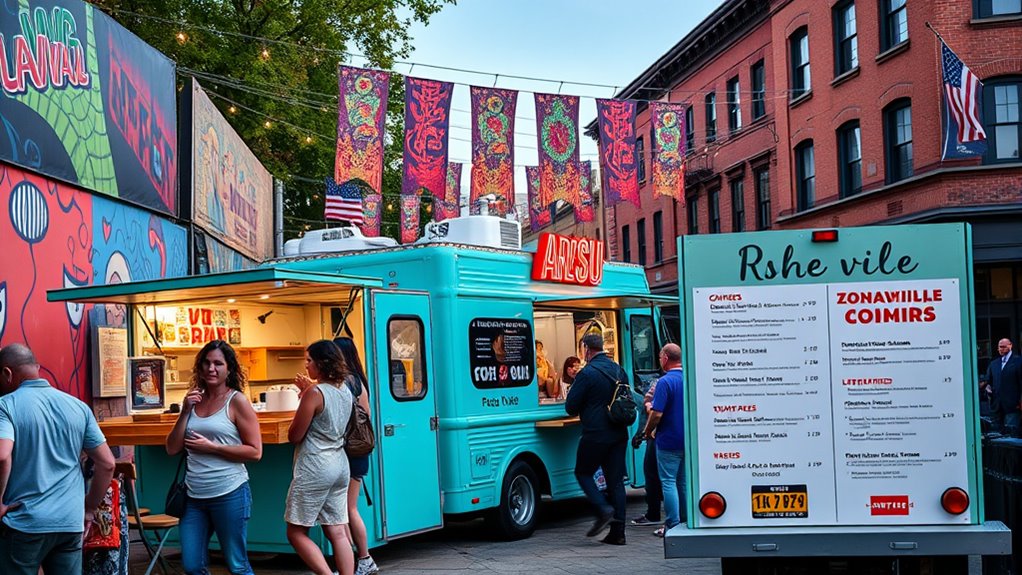
Choosing the right location for your Asheville food truck involves understanding local zoning rules and finding spots that attract customers while complying with regulations. Mobile food vending is only allowed on parcels with approved permits, which must meet zoning district restrictions, minimum lot sizes, and setback requirements—like 10-foot distances from property lines. You can’t encroach into public right-of-way or frontage setbacks, and the site must allow for vehicle maneuvering, pedestrian safety, and emergency access. A zoning permit is necessary for temporary use, with interim permits valid for 1-2 years. You’ll need buffers—such as plantings or fences—especially near residential zones, and parking must meet district-specific standards. Avoid locations within 500 feet of residential areas to prevent conflicts, and prioritize sites with high pedestrian and commercial activity. Proper licensing and permits are also required to ensure full compliance with local regulations. Additionally, understanding zoning compliance helps prevent future legal issues and ensures your operation remains active and profitable.
Developing a Safe and Appealing Menu

Developing a safe and appealing menu is essential for your Asheville food truck’s success, as it directly impacts both customer satisfaction and compliance with health regulations. Focus on ingredients with low foodborne illness risk, prioritizing cooked items and minimizing raw foods unless handled under strict safety protocols. Use pre-packaged foods when possible to reduce preparation hazards. Guarantee menu items can be safely stored at proper temperatures using refrigeration or approved ice. Avoid complex assembly or ingredients prone to cross-contamination, like raw sprouts or unpasteurized products. Label allergens clearly and offer options for gluten-free, vegetarian, or vegan diets. Use separate utensils and prep areas for allergen-sensitive dishes, and train staff on allergen management. Maintaining food safety standards and transparent communication builds trust and keeps you compliant.
Effective Marketing and Operational Strategies
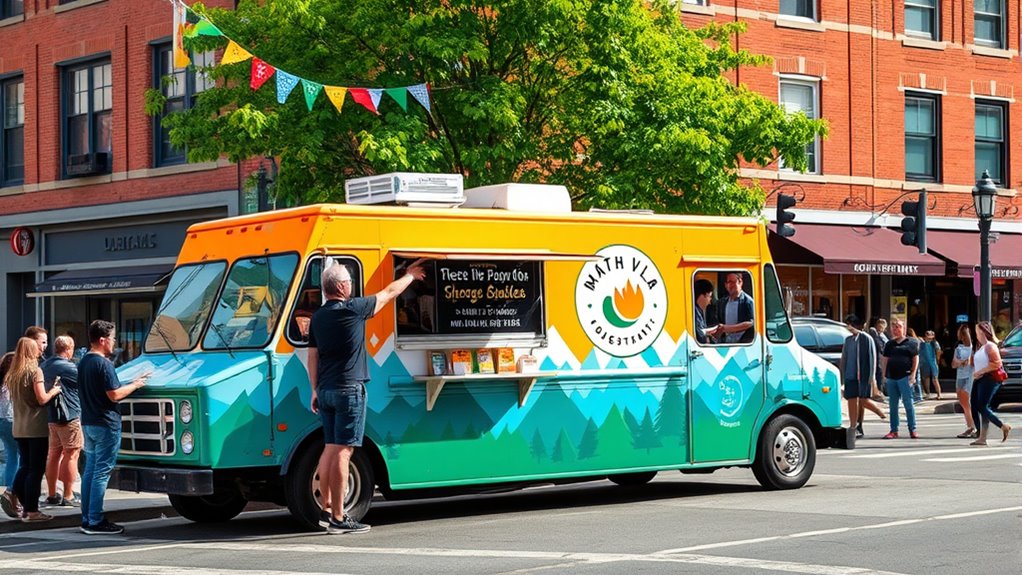
To maximize your Asheville food truck’s visibility and attract a steady flow of customers, you need to implement strategic marketing and operational practices. Participate in local food festivals, farmers’ markets, and community events to boost exposure and connect with diverse audiences. Collaborate with nearby businesses like breweries or coffee shops for cross-promotions. Use street teams to distribute samples, flyers, and coupons in high-traffic areas, creating personal connections. Establish locations at popular food truck parks and near busy commercial districts, rotating spots to reach different crowds and adapt to seasonal changes. Leverage digital marketing by targeting millennials and Gen Z with geo-specific hashtags and exclusive online offers. Consistent branding, engaging signage, and loyalty programs reinforce your presence, while maintaining food safety and efficient operations support your marketing efforts. Effective marketing strategies are essential for building a loyal customer base and ensuring long-term success. Additionally, utilizing email marketing can help you stay connected with your customers, promote special events, and share updates about your food truck location and menu offerings.
Frequently Asked Questions
What Are the Specific Health Inspection Standards for Asheville Food Trucks?
Your food truck in Asheville must pass health inspections that ensure food safety standards are met. You’re required to have proper handwashing sinks, maintain correct food temperatures, and use NSF-approved equipment. Staff should follow hygiene practices, and routine site inspections are conducted by environmental health specialists. If deficiencies are found, you’ll need to rectify them before operating again, especially on university property. Staying compliant keeps your food truck safe and lawful.
How Do I Find a Suitable Commissary or Licensed Restaurant in Buncombe County?
Finding a suitable commissary is like charting a map to hidden treasure. You should contact Buncombe County Environmental Health or local health departments for a list of approved commissaries. Local food truck groups or associations can also guide you. Make sure to verify that the commissary meets sanitation standards, offers water and waste services, and aligns with your schedule. Always confirm agreements in writing to keep your journey smooth and compliant.
Are There Any Restrictions on Alcohol Sales From Food Trucks in Asheville?
You can sell alcohol from your food truck in Asheville if you obtain an ABC permit and follow state laws. You must guarantee food sales are at least 30% of gross sales, and alcohol containers meet size and labeling requirements. Remember, open containers are prohibited in public spaces, except in designated social districts. Keep alcohol sales within permitted zones, avoid promoting alcohol verbally, and respect distance rules near schools and churches.
What Insurance Coverage Is Recommended for Operating a Food Truck in Asheville?
Did you know that proper insurance can prevent 90% of potential legal issues? For operating a food truck in Asheville, you should get general liability insurance to protect against customer injuries and property damage. Commercial auto insurance is mandatory for the vehicle. Consider property and equipment coverage for your appliances, and if you have employees, workers’ comp is essential. These policies safeguard your investment and make certain you adhere to local regulations.
How Can I Get Assistance With Permitting Processes From Local Authorities?
You can get assistance with permitting processes from Asheville’s local authorities by reaching out to the Permit Application Center, Buncombe County Health Department, and Asheville City Planning Department. They offer in-person and online support, guidance on documentation, and pre-application meetings. Staff are available by phone or fax to answer questions, review plans, and help you understand requirements, making the process smoother and ensuring you stay compliant throughout your food truck launch.
Conclusion
Starting a food truck in Asheville is an exciting venture, but remember that proper permits and a solid budget are essential. With over 1,200 food trucks nationwide, Asheville’s vibrant food scene offers great opportunities—just stay compliant with zoning rules and craft a menu that stands out. Effective marketing can boost your success; in fact, food trucks see a 30% sales increase when actively promoted. Get ready to turn your passion into a thriving business!




